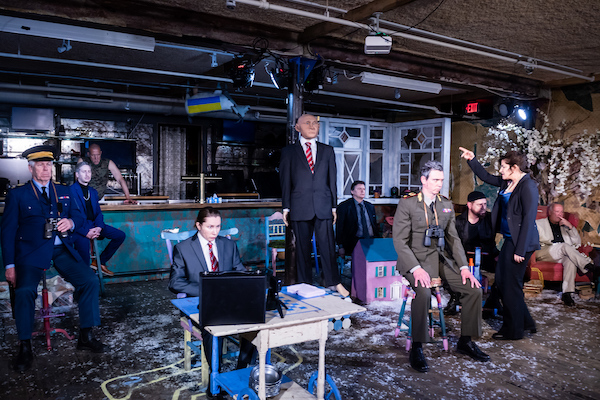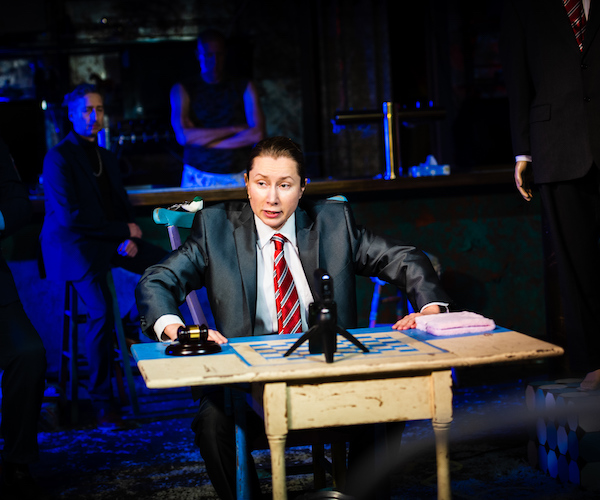Theater Review: “The Gaaga” — A Savagely Funny Dream of Ukrainian Retribution
By Bill Marx
The Gaaga’s humor is driven by rage, anger, and disgust, emotions that are not often found in our domesticated (for easy consumption) theater scene.
The Gaaga (The Hague), a site-specific phantasmagoria written and directed by Sasha Denisova. Co-directed by Igor Golyak. Environmental and projection design by Irina Kruzhilina. Staged by Arlekin Players Theatre & (zero-G) Virtual Theater Lab at the Beat Brew Hall, 13 Brattle St., Harvard Square, Cambridge. Live, in-person through June 18. STREAMING WORLDWIDE: Live online through June 18.

The cast of The Gaaga in the bomb bunker. Photo: Irina Danilova
Why is The Gaaga such a welcome production? There has been virtually nothing about Russia’s 2022 invasion of Ukraine on Boston’s stages. Nada. Apparently, our theater artists are indifferent to a horrific conflict that is changing the world. And that apathy about what is going on around us is not a one-off. Nature itself is under dire threat — climate scientists have now concluded that it is too late to save Arctic summer ice. (Of course, these tragedies intersect: the Ukrainian dam the Russians are accused of blowing up is an environmental disaster.) You would think the climate crisis or a major war in Europe would inspire work from serious dramatists and stage companies, shake up staid and established repertories. But, as far as I can see, there are no productions addressing the ongoing climate catastrophe in next year’s season. That might change, if some of the recent wildfire smoke that descended into the Northeast from Canada wafted into the right nostrils at our local theaters.
Accelerated by Covid and its aftermath, our stage companies are serving up narrow and fearful fare, commercial and politically safe, Broadway-ized to suitable puerility. Instead of exposing how the bland is being marketed as edgy, our theater critics sit twiddling their thumbs. They should be demanding that vital stories about the climate and war be told and awareness raised. The art of the theater is valuable (in part) because it inevitably goes beyond scare statistics and headlines, simple doom and gloom. The Brown University Environmental Storytelling Studio (TESS) is producing narratives that would make for effective theater in the right hands. Why not produce scripts that deal with the Ukraine conflict? My hope is that this detachment from reality will end. In the future, theater companies and critics will have to think less about selling liberal pieties and more about an imperative articulated by the late Barry Lopez: “Cooperate with one another or die.” At the moment, our stages are not grappling with that idea or with other elemental realities. Is this disappointing, sad, laughable, cowardly, irresponsible? Take your pick. I vote for all of the above.
So kudos to the Arlekin Players Theatre for addressing the war in Ukraine with the American premiere of an uneven but fierce farce by Ukrainian playwright Sasha Denisova. To its credit, the script’s acidic antics are not just about lambasting Russian barbarity: the play indicts a self-destructive status quo shaped by the dementia of the powerful for their own benefit, a point that resonates here and elsewhere around the world.
When Bertolt Brecht savaged the Nazis in the ’30s (Fear and Misery in the Third Reich, The Resistible Rise of Arturo Ui) his plays burlesqued their rise to power. He envisioned Hitler and his brutish crew as opportunistic gangsters, antisemitic thugs. Denisova takes a different satiric strategy: we see Putin and his dangerously crazed company through the eyes of a Ukrainian girl in Mariupol. This is her dream of vengeance against the higher-ups behind an inhumane military invasion that killed her family and sent her off to be adopted in Russia. In a bomb shelter littered with toys (dollhouse, rocking horse) we see Putin and his various sycophantic enablers put on trial for war crimes in The Hague, with dueling defense and prosecuting attorneys undercutting each other’s positions. TVs on the walls screen footage of what is going on in the “court” as well as scenes of destruction — bombings, purported genocides, etc.
Denisova invites us to leap over the uncertain present to witness a fun house vision of future judgment. The Hague trial pressure cooker propels the play’s captive monsters into psychological breakdown; those profiting (or turned-on) by Russian aggression are lampooned through caricature, their psyches dissipating into a cesspool of backstabbing, excuse-mongering, and cackling megalomania. It is clear that the collective insanity driving the Russian invasion was obvious from the get-go. The Gaaga’s sour kicker is that this farcical “phantasmagoria” may be about as close as many of these sick overlords will ever get to facing justice for their crimes.

Polina Dubovikova as Putin in The Gaaga. Photo: Irina Danilova
The characters are based on real-life figures in the Russian power structure, including an oligarch, a pair of military poobahs, a media propagandist, a mercenary, a soldier, and Putin himself. The performance style is broad, the characterizations, at least for a good portion of the first act, in the farce mode of Dr. Strangelove. At first, Putin and his cronies chat about life in their cells, and there are some laughs here, from petty complaints about the food and the lack of internet access to visions of geese as carriers of biological toxins in the West’s eternal war against Russia. Still, when the antics become too sloppily clownish (and they do on occasion) they end up minimizing the criminality on display. Also, prisoner interrogations are the backbone of the play’s structure and these interviews are strung along a bit too self-indulgently. There is none of the inevitable rhythm drummed up by the mechanics of a trial.
But in its second act The Gaaga comes into its own as it circles Putin’s fetid heart of darkness. The vicious spoofing turns absurd, even frightening. These sketches tap into rampant homicidal paranoia, amoral militarism, earnest homages to the greatness of the USSR (including Stalin), halfhearted rationalizations for mass killing, and sadistic delusions of grandeur. Through it all runs a merciless trivialization of human life. An amusing send-up of Swan Lake does a neat number on Russia’s love (especially among the privileged) for the country’s treasured “high culture.” (Though Dostoevsky would no doubt recognize this cadre of black-souled grotesques.) When Putin and others are invited to explain their motives for invading Ukraine — mixing flickers of realpolitik truth (the West’s complacency about a conflict that began in 2014) into their historical derangement — the proceedings tip into a chilling nihilism, capped by a suicidal oligarch’s confession that the kleptocracy had a good thing going, before the paradise of the rich-getting-richer was ruined by the blunder of Ukraine. Denisova supplies a prophetic look at how venial corruption is supercharged by technology — disinformation at the service of greed and nationalism, a modern way of elevating “blood” over secular institutions.
Denisova and co-director Igor Golyak move their large cast around a cramped stage space with gung-ho brio, though at times the hand-held cameras, screens, and props are lost in the tumult. The ironic juxtaposition between self-aggrandizing speechifying by the characters on stage and video-verified fact is lost. The performers are lively and generally on target in skillfully dismembering the play’s lineup of terminal narcissists. The best contributions are made by those, such as Daniel Boudreau as Prigozhin, Robert Walsh as Surovikin, Ilia Volok as Patrushev, and Polina Dubovikova as an amazingly lookalike Putin, who manage to be as creepy as they are amusing.
The Gaaga‘s humor is driven by rage, anger, and disgust, emotions that are not often found in our domesticated (for easy consumption) theater scene. May this production inspire our stage artists and theater companies to leave their cushy bunkers of intellectual, political, and emotional comfort.
Bill Marx is the editor-in-chief of the Arts Fuse. For four decades, he has written about arts and culture for print, broadcast, and online. He has regularly reviewed theater for National Public Radio Station WBUR and the Boston Globe. He created and edited WBUR Online Arts, a cultural webzine that in 2004 won an Online Journalism Award for Specialty Journalism. In 2007 he created the Arts Fuse, an online magazine dedicated to covering arts and culture in Boston and throughout New England.
Tagged: Arlekin Players Theatre, Igor Golyak, Irina Kruzhilinia, Putin, Russia, Sasha Denisova, The Gaaga

An amazing and chilling play to experience. I’ve been to Russia a dozen times and Ukraine three dozen times working with NGOs and supporting civil society. putin’s unprovoked invasion of and lies about Ukraine do not represent the Russians I know. Ukraine is an awesome defender of freedom and democracy. Yes, let there be trials for violations of human and national rights.